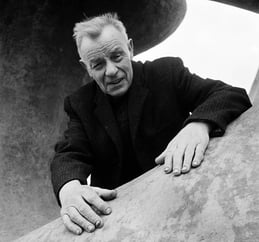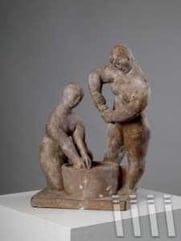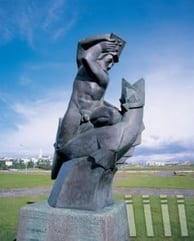A look into the life and emotions of Ásmundur Sveinsson
One of the more interesting exhibitions in Reykjavík city this year is, no doubt, ‘The Fire Within’ by Ásmundur Sveinsson (1893-1982), one of Iceland’s most innovative artists in the twentieth century.
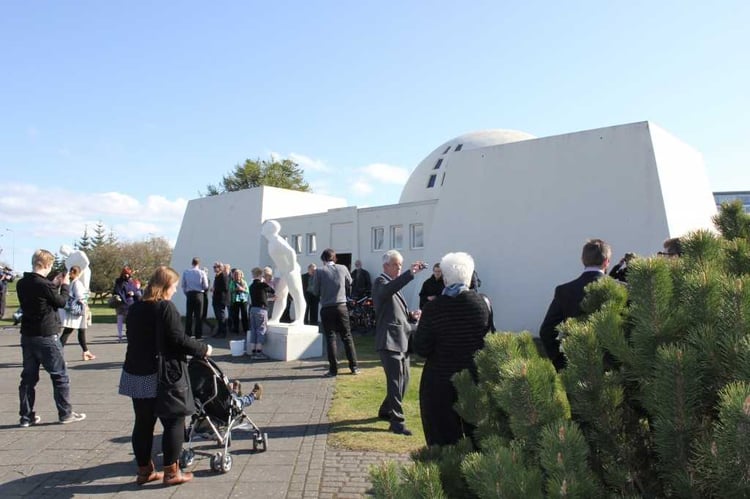 The exhibition is held in Ásmundarsafn, one of the three facilities belonging to the Reykjavík Art Museum, and the former residence of Ásmundur Sveinsson that he built with his bare hands. The exhibition began on 5th May runs until 14th April next year, and exhibition manager Kristín Guðnadóttir and Public Programme Manager Kristín Dagmar Jóhannesdóttir told reporter Júlíana Björnsdóttir about the artist and the idea behind ‘The Fire Within’.
The exhibition is held in Ásmundarsafn, one of the three facilities belonging to the Reykjavík Art Museum, and the former residence of Ásmundur Sveinsson that he built with his bare hands. The exhibition began on 5th May runs until 14th April next year, and exhibition manager Kristín Guðnadóttir and Public Programme Manager Kristín Dagmar Jóhannesdóttir told reporter Júlíana Björnsdóttir about the artist and the idea behind ‘The Fire Within’.
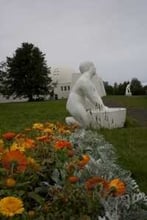
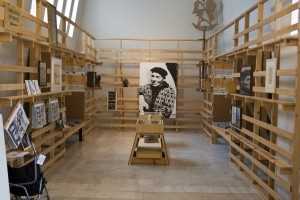 Ásmundur Sveinsson returned to rural Iceland in 1929, the year the Great Depression swept across the world, after residing in the heart of European culture—in glamorous cities like Paris and Stockholm.
Ásmundur Sveinsson returned to rural Iceland in 1929, the year the Great Depression swept across the world, after residing in the heart of European culture—in glamorous cities like Paris and Stockholm.
Ásmundur commenced building his future home in Sigtún on the rural borders of an expanding city. In the museum lobby, the construction history is traced from the raw sketches in 1942 to its completion in 1950.
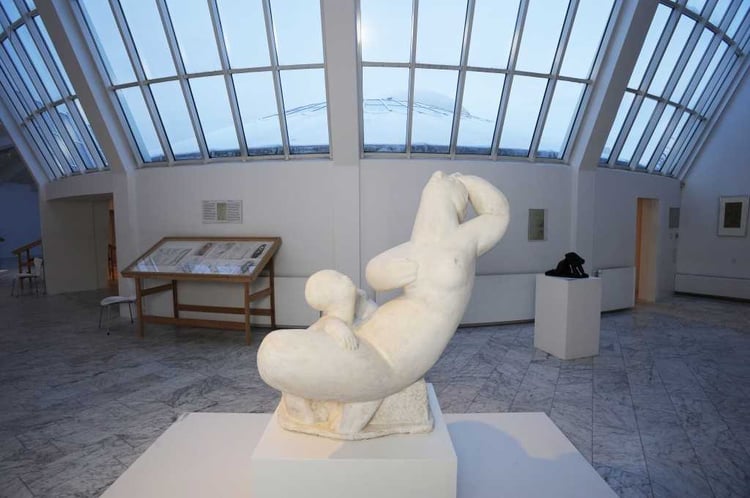 ‘The Fire Within’ is the narrative of Ásmundur’s personal sorrows and joys and his curiosity of the great race to space in the sixties. It opened with a symbolic performance of two young children, the grandchildren of Rannveig Pálmadóttir whom, as a child, Ásmundur took under his wing and introduced to the world of art by asking her to fetch a pail of water, soap and a cloth and wash the feet of the sculptures in his garden, now known as Sculpture Park. Her grandson and granddaughter were asked to the do the same which they did, slowly and respectfully, as their grandmother had once done.
‘The Fire Within’ is the narrative of Ásmundur’s personal sorrows and joys and his curiosity of the great race to space in the sixties. It opened with a symbolic performance of two young children, the grandchildren of Rannveig Pálmadóttir whom, as a child, Ásmundur took under his wing and introduced to the world of art by asking her to fetch a pail of water, soap and a cloth and wash the feet of the sculptures in his garden, now known as Sculpture Park. Her grandson and granddaughter were asked to the do the same which they did, slowly and respectfully, as their grandmother had once done.
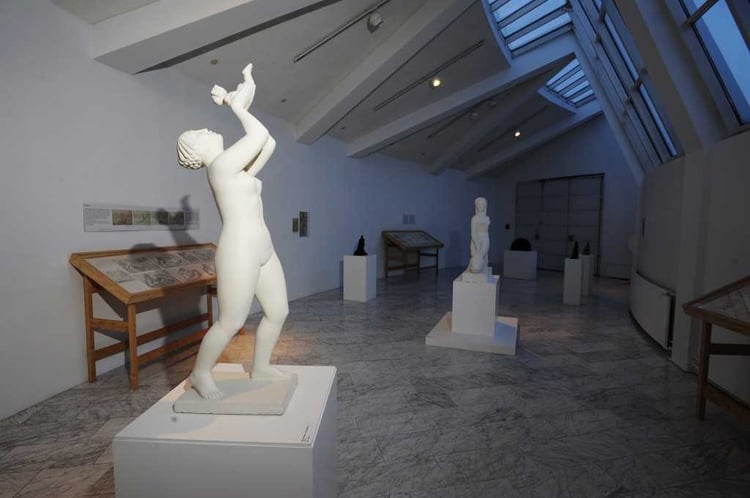 The exhibition itself is divided into three central themes each enhanced with rich and symbolic wall paintings and intense lightning.
The exhibition itself is divided into three central themes each enhanced with rich and symbolic wall paintings and intense lightning.
The first theme is the ‘Garden’ for which the inner wall in the Crescent work and exhibition space was painted green. The theme celebrates his love and admiration of women. In many of his works, the maternal representation of womanhood prevails but in the garden, the woman is an erotic but a tender lover and she is celebrated as such. ‘Man and Woman’ is a symbolic piece wrought in red clay to underline her raw eroticism and tenderness.
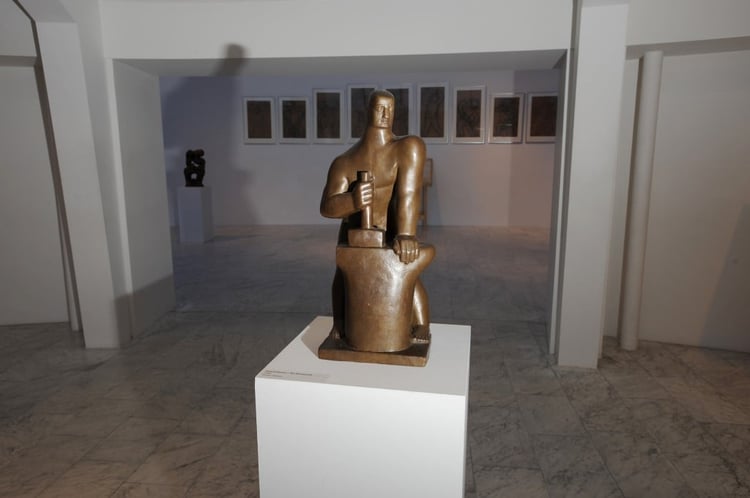 The second theme is the ‘Battlefield’ for which the outer walls of the Crescent work and exhibition space are painted in dark red. The battlefield is life itself and portrays the artist’s bleeding heart and his sorrows in life. ‘Black Clouds’ is a dark-gray concrete and obsidian piece in which a voluptuous but barren woman figure with swollen breast looks down on the void in her empty embrace.
The second theme is the ‘Battlefield’ for which the outer walls of the Crescent work and exhibition space are painted in dark red. The battlefield is life itself and portrays the artist’s bleeding heart and his sorrows in life. ‘Black Clouds’ is a dark-gray concrete and obsidian piece in which a voluptuous but barren woman figure with swollen breast looks down on the void in her empty embrace.
Ásmundur survived the two great wars of the twentieth century and several works in the exhibition are representative of his experiences both from afar and after WWII when he travelled to the mainland of Europe and witnessed the devastation of unthinkable cruelty.
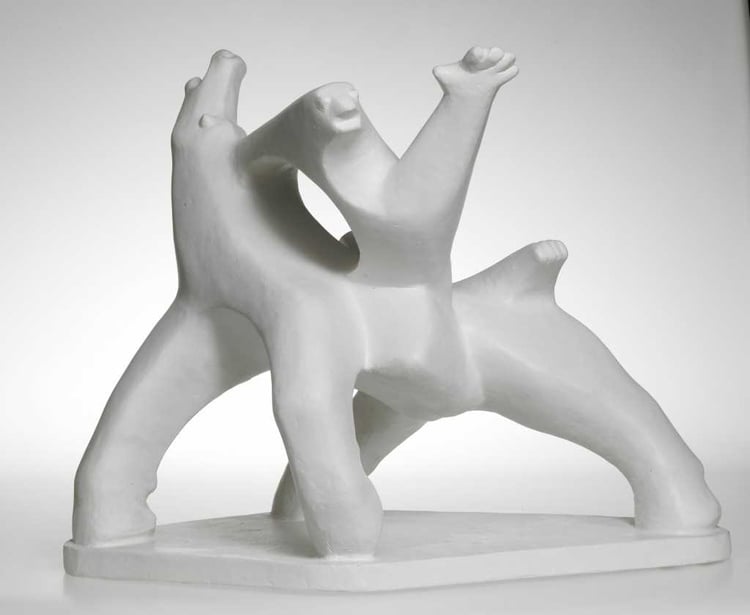 The third, and the most mind-blowing theme is the ‘Yearning for Space’. Influenced by the great race to space in the late fifties and sixties, Ásmundur’s rich imagination gave birth to pieces such as ‘Flying Saucers’, ‘The Last Migratory Bird’, ‘Harmony of the Spheres’ and ‘Yearning for Space’, all located in the Pyramid.
The third, and the most mind-blowing theme is the ‘Yearning for Space’. Influenced by the great race to space in the late fifties and sixties, Ásmundur’s rich imagination gave birth to pieces such as ‘Flying Saucers’, ‘The Last Migratory Bird’, ‘Harmony of the Spheres’ and ‘Yearning for Space’, all located in the Pyramid.
 The centre of the theme however is in the blue Dome, a stairway away from the museum lobby. The three pieces are small in scale but direct the eye to the very centre of the dome where voices travel far and ring loudly in the lobby. The mood is captured with the growing sense of losing one’s balance, a sensation that runs through the body as one returns to the white-walled lobby.
The centre of the theme however is in the blue Dome, a stairway away from the museum lobby. The three pieces are small in scale but direct the eye to the very centre of the dome where voices travel far and ring loudly in the lobby. The mood is captured with the growing sense of losing one’s balance, a sensation that runs through the body as one returns to the white-walled lobby.
Opening hours are from 10 am to 5 pm daily from May 1 to September 30, and 1 pm to 5 pm from October 1 to April 30.
For further information about the exhibition go to
www.artmuseum.is or contact the museum by phone in 553 2155.


